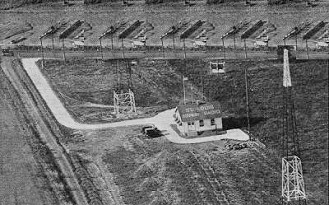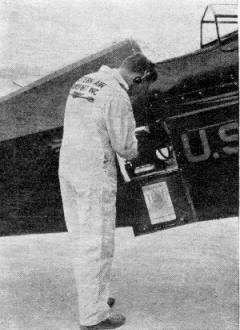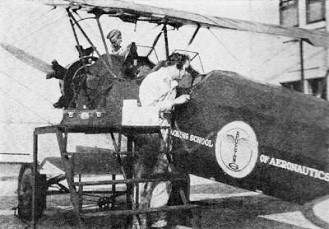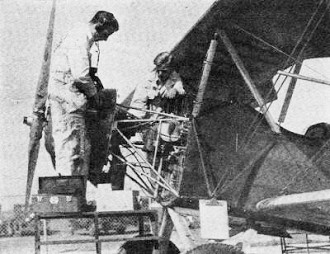How to Break into the Aviation Radio Game |
|
Yes, this is another article that will probably appeal to a small percentage of RF Cafe visitors, but please countenance my indulgence in things aeronautical as well as things electrical. The early 1930s was a time when both airplanes and electronics were a wonder and a mystery to most of the public worldwide. Of course today both are still a mystery to the public but the wonder is gone - it's merely taken for granted. Many idiosyncrasies of airborne electronic communications were encountered for the first time, like the need for proper grounding and static electricity dissipation. Ruggedization of chassis assemblies in terms of mechanical vibration and shock as well as for temperature extremes was a real challenge to engineers, technicians, and pilots. As the state of the art advanced, pilots and passengers placed gradually more and more reliance and confidence on electronic systems, which motivated the creation of more electronics for easing pilots' flight workload and enabling flight during previously unnavigable conditions, which motivated further improvements. How to Break into the Aviation Radio Game By Lieut. Myron Eddy*"I most heartily concur in Colonel Lindbergh's advice to young men to 'take the radio side of aviation.' It is the fastest, most fascinating and profitable part of the air game." Aviation radio operators what sort of men are they? Having trained hundreds of them, I am often asked that question. Wherein do they differ from ships' radio operators or the men who operate the broadcast station equipment? Interesting questions, these. The answer is that they are not so very different. In fact, they are in many instances the same men - ships' operators often take up aviation radio work. But to make good they must like aviation and be something of a mechanic. To "like aviation" usually means that they are familiar with airplanes and engines, that they would like to fly, that they would be unafraid in the air. There are many strictly "ground" jobs for radio operators, but I think that air-plane operators are the ones who usually get the most fun out of their job. First "Try Your Wings" So if you are thinking of taking up "the radio side of aviation," which Colonel Lindbergh not long ago advised was "the coming thing," first fly a bit. Get your flight reactions established by flying. And do something while you are in the air. A radio operator concentrates on his work, every minute of every flight. You must learn to do the same and still not be tired. Pan-American radio operators must all accept flight duty when assigned, even though employed at radio stations on the ground. The first of our questions are answered, then - aviation radio operators should be the sort of men who do not get air-sick. In this respect they must be different from the ship's operator who may be relieved by another operator if he becomes sea-sick. There is no relief operator aboard a plane. In fact, the operator should be able to relieve the plane mechanic if the latter is overcome with gas fumes or injured while in flight. On most planes the operator is referred to as the "radio mechanic" because he serves as both radio operator and plane mechanic. Sometimes he is the only mechanic aboard. In this case he usually holds an airplane mechanic's license. In every case he must hold a commercial radio operator's license - a broadcast operator's license simply will not do. Because it seemed that there was a special sort of operator needed for airplanes, the Department of Commerce (Radio Division) authorized, nearly a year ago, a special Aircraft Radio Operator's license - Commercial Third Class. A working speed of only fifteen words code is required to secure this class of license. This is because a greater speed in transmission and reception aboard airplanes is unnecessary and undesirable, accuracy being more essential than speed. Indeed, accuracy and dependability are the chief professional qualifications desired in the airplane radio operator. The ability to maintain the radio set and get the messages through on schedule is the main thing. Testing Radio Beacon Mr. H. L. Clemens, Assistant to Radio Engineer, testing the beacon and weather receiver on an Eastern Air Transportation mail plane Airplane Equipment Consider the equipment to be maintained and operated: there is a transmitter, two receivers and sometimes a course indicator. Generator, batteries and antennas must also be watched. Regulations governing transmission of messages must be known and adhered to and schedules handled "on the dot." The operator should also know the Airways - every light and radio beacon, the bearing and distances between them and the type of terrain flown over. The pilot will tell him the air speed being flown. The compass will indicate the amount of drift caused by wind. Between messages the quick operator will be able to estimate accurately the ground speed being made and therefore the time of arrival to be radioed to the next airport ahead. Yes, the radio operator aboard a transport plane is a very important man, so far as flight is concerned. Now what about his buddies on the ground? There are two of them, a radio service or maintenance man at the airport who will overhaul the plane set at the end of the run, and an Airways station operator who handles the actual message traffic with the plane. Their work is also important. The reports of these two men make or break the young plane operator; if the messages do not come through and the airport maintenance man locates a fault in the set that could have been remedied in the air, the plane operator is probably "grounded" for a while, to spend weary hours in disgrace washing down planes and playing radio messenger boy. Messages must get through! As a matter of fact, they usually do get through, thanks to the combined efforts of the plane operator, the station operator and the maintenance man. Ground Station Operators The good station operator works his set all the time. He services the set as he operates it. He "picks up" the plane calling other distant stations first; then he takes over the handling of traffic at the most convenient time according to existing schedules. Every minute of every hour is scheduled, either to a particular station, or to planes east, south, west, north. He hears them all in sequence and at the proper time exchanges a brief call with each to establish contact. As each, in turn, approaches and passes, he "clears" them, reporting their position by land wire or teletype machine to the proper flight-division airport. Sometimes the Airways station operator becomes an impromptu radio serviceman or plane mechanic. If a plane lands at his station he may become both, because at every stop made, and especially whenever there is a non-scheduled landing, the engine, plane and radio set are inspected and tested. If it is an emergency landing, full details must be forwarded to the division headquarters at once, without interfering with the work to be done on the plane. In this case the relief operator is hurriedly called and put on the key while the regular operator hurries out to meet the plane, helping to man the landing lights at night if it is an "intermediate" field. Aviation Radio Serviceman at Work Testing the bonding of a training plane by comparing with a receiver which has been set outside of the plane. Requirements and Rank These station operators are always assistants to the field superintendent and usually make up and send weather reports as a part of their regular duties. They are all required to be not only radio-telegraph but radio-telephone operators and must therefore neither stutter nor lisp! Living quarters, are usually provided and at government stations the salary received is from $1640 per annum, up. Upon being appointed to one of these stations there is a probationary period of six months, during which time the probationer may qualify at the kitchen sink or solo at the lawnmower. But they like it! Day and night great airplanes soar by overhead, speeded on their way by work at the key and the microphone. Through storm and fog, the station man keeps his radio beacon sending out its guiding beam to carry the pilot straight through to a safe landing. There is a thrill in this. And yet the station job lends itself to domesticity. The married man at an Airways station eats and sleeps "home" every night. For this reason the older men with families usually end up at either an Airways station or at an airport. And what does the radio serviceman at the airport do when he takes over the set at the end of each run? Briefly. he works the set. If it won't work, he finds out why and replaces the equipment that is faulty. He charges the battery. He sets up the generator on a test bench and gives it a speed run. He loads a "dummy" antenna and runs the transmitter full blast, noting its maximum output into this "dummy" antenna. He tests every tube in the receiver and listens for "distance" to determine its sensitiveness. If it is more noisy on the plane than off, he checks up on the airplane engine's ignition system to see if it is properly shielded and also if the plane itself is properly bonded to form a perfect counterpoise. In performing these tests he strings the trailing type antenna out in different directions to nearby poles, in order to determine any directional tendencies. The results of all tests are recorded and a copy furnished the plane operator before the next flight. Then, just before the take-off, the entire radio set is tested by both serviceman and plane operator, the latter signing the test report as "condition satisfactory for flight work." Overhauling Ignition Shielding System Aviation maintenance men checking the ignition shielding system of a plane so necessary for quiet operation. Employment Conditions The situation regarding employment is peculiar and the governing facts are of interest. There are now nearly 400 radio-equipped planes in the United States and there will be more each succeeding year, all licensed as mobile stations. All are required to be manned by licensed radio operators. This influences the employment situation. Approximately 75% of the air-transport companies use radiophones on their planes. Many of these planes do not carry radio operators, although there must be one pilot aboard holding a radiophone license. Pan-American is a notable exception - they fly mostly over water, communicate longer distances and use radio-telegraphy exclusively. They say it is the only thing for distance, accuracy and dependability. They hire experienced, first-class commercial operators only. Many of these operators qualify for an airplane or engine mechanic's license. This license can only be secured by one having had experience on a plane, and an operator holding it usually makes more money than a ship's operator. He is worth more. To get a job in aviation as a radio maintenance man you should be a good trouble-shooter on aircraft sets, a good battery man and not averse to gassing and oiling planes. Occasionally a maintenance man will be required to relieve the airport radio operator, which means that he should know the company's communication system as well as its sets. The most important thing is to be absolutely reliable and also adaptable to other kinds of jobs. When you "OK" a plane set, it must thereafter work perfectly throughout the next flight. Sometimes you have to check the plane operator, to eliminate the flight trouble! Assuredly the airport radio maintenance man must be a man of ability and tact. The following are ·the more important requirements for assistant radio operator (Airways). This is a Civil Service job starting at $1800 a year with a $60 raise every year up to $2000. This sounds like a pretty good job, and it is. Assistants may be promoted to operator in charge, any time after six months' service, at salaries ranging from $2300 to $2800, and also to radio electricians at $3000 and more per year. The assistant's job is open to any operator between 18 and 40 who is sound of wind and limb and who has no impediment of speech or "brogue" accent. Applicants will not be examined personally, but will be rated on their training, experience and fitness. They must be able to send and receive and type at speeds up to 30 words per minute. There is a popular belief among civilian radio men that ex-army and ex-navy men get preference when it comes to employment in aviation. This misconception is caused by many unrelated facts. It is a fact that the Civil Service Airways jobs are often secured by disabled veterans. These men are legally entitled to a handicap on their examination which often puts them at the head of the eligible list. Civilian flying concerns are honeycombed with good men who learned the air game in the army or navy. These men favor their friends because they know the air game as well as radio. Radio operators who learn the business of commercial aviation will progress upward as airport superintendents, field managers, plane despatchers, airline managers and officials of air companies. There are few old-time aviation radio operators, because the good ones have been promoted out of radio and more directly into aviation. Now do you see what sort of men aviation radio operators must be? Pretty good all-around men. Men who know three sides of the game: flying, operating, and maintenance. Able to sympathize with the troubles of the other fellow but not to condone his faults. Men without alibis - men of character, not afraid. To this type of man aviation radio promises much interesting work, on the ground and in the air, as well as a great future; a future to be filled with accomplishment and personal advancement. I have trained radio men of this type in the navy for years and am now training men for commercial aviation jobs and I find it always works out so that the better the man the better the aviation radio operator will be. * Author, Aircraft Radio.
Posted February 23, 2021 |
|




